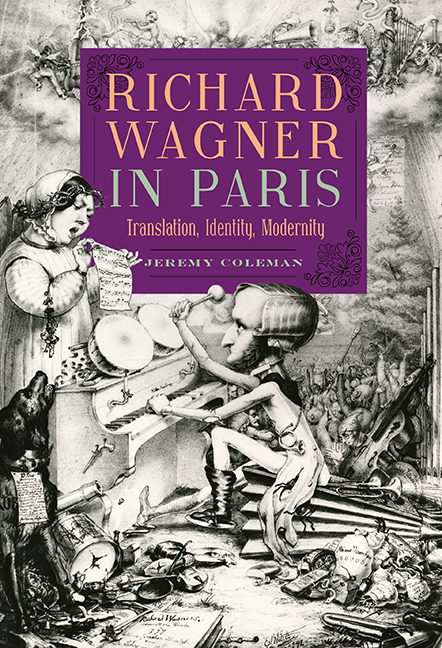Book contents
- Frontmatter
- Dedication
- Contents
- List of Illustrations
- List of Music Examples
- Note on the Text
- Acknowledgements
- Abbreviations
- Introduction: Wagner Against the Grain
- PART I PARIS YEARS, 1839–42
- PART II DRESDEN AND ZURICH, 1842–52
- PART III PARIS YEARS, 1859–61
- Conclusion: Universality at the Crossroads
- Bibliography
- Index
Introduction: Wagner Against the Grain
Published online by Cambridge University Press: 25 March 2020
- Frontmatter
- Dedication
- Contents
- List of Illustrations
- List of Music Examples
- Note on the Text
- Acknowledgements
- Abbreviations
- Introduction: Wagner Against the Grain
- PART I PARIS YEARS, 1839–42
- PART II DRESDEN AND ZURICH, 1842–52
- PART III PARIS YEARS, 1859–61
- Conclusion: Universality at the Crossroads
- Bibliography
- Index
Summary
“Babel d'escaliers et d'arcades,
C’était un palais infini”
Charles Baudelaire, “Rêve Parisien”,
Tableaux ParisiensFRIEDRICH Nietzsche remarked more than once that Wagner's only true home was in Paris. He had in mind Wagner's pervasive influence on modernist and decadent French culture of the late nineteenth century (so-called “Wagnérisme” and its satellite discourses). But he was also alluding to features of Wagner's stage works, the nature of his artistic ambition and aspects of his personality that smacked far more of the Parisian dilettante or theatrical impresario than it did of the provincial Kapellmeister. Nietzsche even placed Wagner in the context of French Romanticism of the 1840s, a clear reference to the composer's ill-fated sojourn in Paris from 1839 to 1842 which suggested an affinity that had been present almost from the start. The bon mot is as exaggerated as it is suggestive. Laced with ironic wit, it also betrays deep admiration on Nietzsche's part, an attempt to salvage something of Wagner from the taint of Prussian imperial expansionism and to account for that which continued to fascinate him about a handful of Wagner's stage works.
According to The Case of Wagner (1888), the composer's modernity was bound up with the artistic and cultural movement of French decadence. If German art destroyed culture wherever it spread, as Nietzsche elsewhere claimed, Wagner had taken German identity so close to the brink that in its very excessiveness it resonated with the latest artistic developments in French culture, above all in literature. Where Nietzsche saw the tendency towards the febrile and the voluptuous, not to mention an all-consuming commitment to theatre and theatricality, Theodor Adorno half a century later recognised the origins of mass culture and the dialectic of Enlightenment in his Versuch über Wagner. Adorno traced certain formal and technical elements to Berlioz's idée fixe and instrumentation and to Meyerbeer's grand operas which allegedly reduced politics to mere “spectacle”.
Such observations formed only a marginal part of Adorno's essay on Wagner.
- Type
- Chapter
- Information
- Richard Wagner in ParisTranslation, Identity, Modernity, pp. 1 - 18Publisher: Boydell & BrewerPrint publication year: 2019



